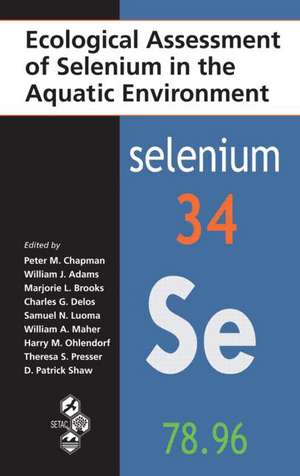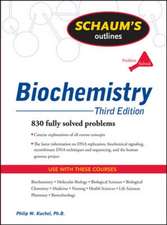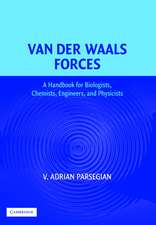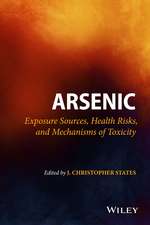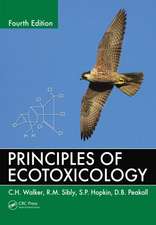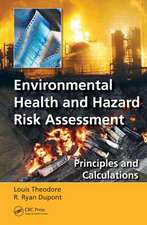Ecological Assessment of Selenium in the Aquatic Environment
Editat de Peter M. Chapman, William J. Adams, Marjorie Brooks, Charles G. Delos, Samuel N. Luoma, William A. Maher, Harry M. Ohlendorf, Theresa S. Presser, Patrick Shawen Limba Engleză Hardback – 6 mai 2010
- Past and current problems related to Se in aquatic environments, together with lessons learned, and provides a generalized conceptual model
- Environmental partitioning, in particular Se speciation leading to its entry into the food chain, and provides conceptual models specific to environmental partitioning.
- Se bioaccumulation and trophic transfer from the physical environment (i.e., water-column particulates), and from primary producers to herbivores to carnivores, including the influence of modifying ecological factors
- Toxic effects from Se, in particular body burdens and their relationship to toxicity
| Toate formatele și edițiile | Preț | Express |
|---|---|---|
| Paperback (1) | 491.39 lei 6-8 săpt. | |
| CRC Press – 19 sep 2019 | 491.39 lei 6-8 săpt. | |
| Hardback (1) | 1224.42 lei 6-8 săpt. | |
| CRC Press – 6 mai 2010 | 1224.42 lei 6-8 săpt. |
Preț: 1224.42 lei
Preț vechi: 1493.19 lei
-18% Nou
Puncte Express: 1837
Preț estimativ în valută:
234.32€ • 254.44$ • 196.83£
234.32€ • 254.44$ • 196.83£
Carte tipărită la comandă
Livrare economică 23 aprilie-07 mai
Preluare comenzi: 021 569.72.76
Specificații
ISBN-13: 9781439826775
ISBN-10: 1439826773
Pagini: 368
Ilustrații: 58 b/w images, 27 tables and 17
Dimensiuni: 156 x 234 x 23 mm
Greutate: 0.64 kg
Ediția:New.
Editura: CRC Press
Colecția CRC Press
ISBN-10: 1439826773
Pagini: 368
Ilustrații: 58 b/w images, 27 tables and 17
Dimensiuni: 156 x 234 x 23 mm
Greutate: 0.64 kg
Ediția:New.
Editura: CRC Press
Colecția CRC Press
Public țintă
Academic and Professional Practice & DevelopmentCuprins
A Pellston Workshop on Selenium in the Aquatic Environment. Executive Summary. What You Need to Know about Selenium. Environmental Sources, Speciation, and Partitioning of Selenium. Bioaccumulation and Trophic Transfer of Selenium. Selenium Toxicity to Aquatic Organisms. Selenium Risk Characterization. Appendix A: Selected Case Studies of Ecosystem Contamination by Selenium. Appendix B: Commentary: Persistence of Some Fish Populations in High-Selenium Environments.
Notă biografică
Peter M. Chapman, William J. Adams, Marjorie L. Brooks, Charles G. Delos, Samuel N. Luoma, William A. Maher, Harry M. Ohlendorf, Theresa S. Presser, D. Patrick Shaw
Recenzii
"… an in-depth reference work … well organized and well written … well illustrated with figures and tables … an enjoyable reading for those who are interested in selenium, especially the investigators, teachers and graduate students involved in selenium research."
—Saura C. Sahu, US Editor, Journal of Applied Toxicology
—Saura C. Sahu, US Editor, Journal of Applied Toxicology
Descriere
Filled with practical guidance on how to conduct selenium risk assessments in the aquatic environment, this book offers the latest information on assessment techniques, gives the current state of contamination in industrialized countries, and raises awareness for developing nations. Written by leading experts, it describes best practices for designing experiments to collect information on aquatic effects and trophic transfer of selenium for risk assessments, presents numerous case studies both US and international, and gives insight as to how current and future ecosystems may or may not be affected.
